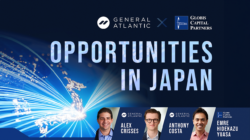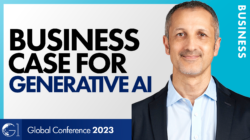Leading High Performing Remote Teams
How can leaders ensure that performance remains high in remote or hybrid-work environments?
Content Marketing
In this course, you’ll learn how compelling blogs, videos, podcasts, and other media can reach customers and drive sales. You’ll also learn steps for creating an effective content marketing plan, and some important ways to measure its impact and success.
Content marketing is a essential digital marketing strategy for companies looking to provide relevant and useful information to support your community and attract new customers.
Get started on your content marketing journey today.
Sustainable Innovation in Times of Disruption: Choices for a Better Society
There are opportunities for progress all around us. The key is to innovate on these opportunities sustainably.
To help identify most effective path forward, you'll need to gain a global perspective to these challenges in an open discussion. How can Japan and the world take action to create a more sustainable, innovative world? Where do you fit in?
It's time to find out.
Social Media & Digital Communications: Impact on Global Public Opinion
Social and digital media have dominated the communications industry for decades. But it's no secret that social media has the power to sway public opinion, and the way in which many companies use these platforms could be seen as manipulative.
What do companies need to be aware of when utilizing social and digital media? How can these mediums be used to better communicate strategically with the world?
Discover what top media and communications experts have to say.
CAGE Distance Framework
Want to expand overseas? The CAGE distance framework can help ensure you're constructing a solid global strategy in four areas: cultural, administrative, economic, and geographic. Learn how to leverage useful differences between countries, identify potential obstacles, and achieve global business success.
Servant Leadership
There's more to leadership than driving a team to profit. In fact, there's a word for looking beyond self-interest to prioritize individual growth: servant leadership. Try this course for a quick breakdown of what that is, how it works, and how it can lead to organizational success.
Strategy: Creating Value Inside Your Company
Have you ever wondered why certain companies are more successful than others? The answer is strategy: internal processes that control costs, allocate resources, and create value. This course from GLOBIS Unlimited can give you the tools you need for that strategic edge.
Strategy: Understanding the External Environment
To plan strategy on any level, you need to understand your company's external environment. In fact, your level of understanding can impact hiring, budgeting, marketing, or nearly any other part of the business world. Want to learn how to do all that? This course from GLOBIS Unlimited is the perfect first step!
Using Japanese Values to Thrive in Global Business
Japanese companies have unique cultural, communication, and operational challenges. But they also have values that have led to remarkable longevity. Check out this seminar to hear how these values help earn trust from overseas head offices and develop employees.
Marketing: Reaching Your Target
Every company works hard to get its products into the hands of customers. Are you doing everything you can to compete? In this course, you’ll find a winning formula to turn a product idea into real sales. Follow along through the fundamentals of the marketing mix and see how companies successfully bring products to market.
Basic Accounting: Financial Analysis
Want to compare your performance vs. a competitor? Or evaluate a potential vendor? Then you'll need to conduct a financial analysis. This course will teach you how to use three financial statements and evaluate financial performance in terms of profitability, efficiency, soundness, growth, and overall strength.
Career Anchors
What drives you to be good at your job?
Career anchors are based on your values, desires, motivations, and abilities. They are the immovable parts of your professional self-image that guide you throughout your career journey.
Try this short GLOBIS Unlimited course to identify which of the eight career anchors is yours!
Leadership with Passion through Kokorozashi
The key ingredient to success? Passion.
Finding your kokorozashi will unify your passions and skills to create positive change in society. This GLOBIS Unlimited course will help you develop the values and lifelong goals you need to become a strong, passion-driven leader.
Finding a job you truly love can feel like an impossible task. One way to approach your dream job search is to look for positions that align with a kokorozashi, or personal mission. By using your kokorozashi as a focal point, you’ll have an easier time reaching your career and personal goals.
Former investment banker-turned-educator Ayako Lainez and former NBA player and founder of Prosperity Rising Ivan Rabb recently spoke at a GLOBIS USA seminar. They shared how they found their dream jobs, what made them decide to switch careers, and top career advice for making decisions.
Below is a transcript of questions from the audience Q&A, edited for clarity. Watch the video above for the keynote speech and dialogue with GLOBIS USA President Tomoya Nakamura.
Next Article
The Ultimate Kokorozashi Guide: How to Visualize Your Personal Mission
Ivan Rabb’s Visualization Techniques for Career Success
What made you consider changing career paths?
Rabb: I believe in synchronicity in my life, and I saw synchronicity after synchronicity daily. It was like, “When am I finally going to listen to what I’m seeing and take a first step?”
When my close teammates told me to take a break, that was an up-close conversation I couldn’t ignore. And I was like, “You know what? If this isn’t a message to at least step back, then what is?”
So just listen, pay attention, be observant.
Lainez: I was an interpreter during that bridge time [between careers]. And I did a lot of interpreting for people that came for equestrian events, teaching people about the equestrian culture, animal-assisted activities. And I saw people from around the globe come and share in Japan.
When I was doing that, I was still thinking, “Well, oh, I want to be like that. Oh, wow. That’s out there in the world.” And taking those pieces together. And then I finally realized it was the coaching and teaching that was what I really liked about working with people.
Rabb: And I think as human beings, we deserve to have more than one experience. Who’s to say that you need to be in the same place for the rest of your life? Just because everybody else is doing it doesn’t mean that it’s your calling. It’s okay to transition and try different things.
Do you deal with social anxiety from leaving careers you’re known for?
Rabb: Yes . . . I do deal with the social anxiety sometimes. At times, I want to avoid the conversation. But I think now I’m at the point in my life where I’m willing to own what it is that I’m doing on a day-to-day basis because I feel like I’m making a difference in people’s lives.
I feel like my purpose is to also give back to the people. If you pay attention to the history of my life and my career, it’s something that I’ve always embodied. I’ve always wanted to teach and mentor the youth and do things of that nature. So it fits.
Lainez: Yes, I do feel a lot of social anxiety because it’s hard to explain who I am. I was an investment banker. Then I was an interpreter. I’m a journalist. And now I teach, and I’m coaching people to get into college.
It’s very difficult to explain what I do for a living, but there is a story behind it. At least I have this title . . . “college counselor” for now.
Rabb: Multifaceted. And that’s great. What’s wrong with that?
Do you feel that your work and your life mission are now aligned?
Lainez: I do. I actually feel really good now. It took such a long time to figure out who I am and what I like to do. I’ve built those networks of people within the para-equestrian community, the equestrian community.
I have knowledge that I can share now because I’ve spent the time learning. Now I have enough in my pocket to say, “Oh, you know what? I’m feeling okay.”
Rabb: I would agree. I also do feel like I’m in that similar space, and it takes time to own it. And I’m still so early in my journey, so I don’t want to claim anything that I haven’t experienced, but I just rely on the relationships that I’ve built over time, rely on the diligence to get up and be consistent in life and also in work.
And I just create goals. I think that’s something that I’ve gotten better at, taking time to create a goal. Because without that, you’re kind of just aimless, and you waste a lot of time.




